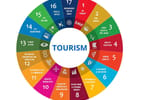The tourism industry is undergoing a transformation, advanced by the use of new technologies by consumers. They can now book every element of their trip online, be informed by and contribute to review sites and navigate their destination with the insight of a resident. There are few areas of the industry that haven’t been affected by technology. Even such sites as Stonehenge and the Louvre have major online information platforms.
This is causing a change in the status of visitors. Traditionally tourists were some of the least informed actors in any city. Technology is upturning the status quo and visitors are now far more knowledgeable about where what they want is to be found. The rise of the hyper-informed tourist is imminent.
If you don’t know where you are – ask a tourist
At a forthcoming conference entitled ‘The Future of City Tourism’, part of the International Festival of Business in Liverpool, a panel of experts will explore whether travel technology will really change the industry as much as this.
“We have seen technology influence every stage of the visitor buying cycle,” said Nick Hall, panellist and Head of the Digital Tourism Think Tank. “It is now rare for anyone to travel without referring to online information.” This transformation has been caused by exponential advances in technology: Moore’s law has seen a doubling of capacity and a halving of cost every two years.”
“So, what we have witnessed so far will accelerate. We can expect far more change, far faster. In this light the rise of mobile technologies is poised to change the industry as much as it has already. Visitors will be innately digital. They will be hyper-informed and seamlessly connected throughout their travel. The challenge this poses to existing tourist businesses is immense, as is the opportunity it holds out.”
Alongside Nick will be Yahoo and the BBC, to explore patterns of consumer behaviour and how this will change when presented with new mobile connectivity.
Is this future real?
“The purpose of this session is to explore and challenge this orthodoxy,” said Tom Jenkins, CEO of ETOA. “These arguments need to be tested. That technology is an important factor is obvious. But is it as important as being really attractive, or really good? People will still want to visit the Louvre, stay in Venice, be guided round the Tower of London by a Beefeater or dine at Noma. They can do – will do – all of these things unelectronically. Part of the thrill of being a visitor is in the reality of the experience, not the virtual reality.
WHAT TO TAKE AWAY FROM THIS ARTICLE:
- At a forthcoming conference entitled ‘The Future of City Tourism', part of the International Festival of Business in Liverpool, a panel of experts will explore whether travel technology will really change the industry as much as this.
- Part of the thrill of being a visitor is in the reality of the experience, not the virtual reality.
- People will still want to visit the Louvre, stay in Venice, be guided round the Tower of London by a Beefeater or dine at Noma.






















